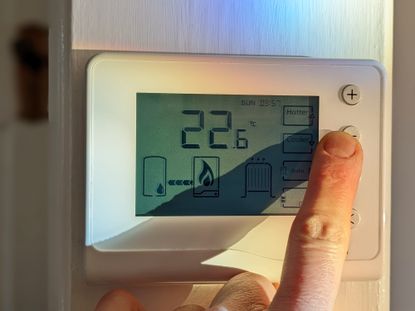Pressure on government to postpone next month’s Energy Price Guarantee hike
The cap on energy bills will rise from £2,500 to £3,000 on 1 April, despite falling wholesale gas prices. Campaigners say the chancellor must postpone the hike to avoid millions more people falling into fuel poverty


Pressure is growing on the chancellor, Jeremy Hunt, to postpone next month’s Energy Price Guarantee (EPG) hike - or risk millions more people falling into fuel poverty.
Ofgem, the energy regulator, said on Monday that its cap on the amount suppliers can charge for gas and electricity for a typical household paying by direct debit would drop from £4,279 to £3,280 a year on 1 April. This reflects falling wholesale gas prices.
The Ofgem price cap is different to the government’s EPG, which was introduced in October 2022 to protect households from soaring energy costs, which had been inflated by the war in Ukraine.
The EPG is currently at £2,500, meaning a typical household's annual energy bill for gas and electricity is capped at £2,500. (Although note the word “typical” - a customer that has a big house and/or uses a large amount of energy could pay more than this).
Hunt said in last year’s Autumn Statement that the EPG would increase to £3,000 this April, in a bid to reduce the cost of the government subsidy it pays to energy providers. According to the analyst Cornwall Insight, the government will save £2.5bn by raising the guarantee.
But now the chancellor is facing mounting pressure to postpone the EPG hike. The consumer campaigner Martin Lewis and more than 85 organisations and charities have urged the chancellor to keep the support at its current level until July.
Lewis argues that the “provisioned government expenditure on the energy subsidy will be billions less than expected” due to falling energy prices. He adds that if Hunt does not postpone the hike, the charity National Energy Action predicts that the number of fuel-poor households will rise drastically from 6.7 million to 8.4 million from April.
Look After My Bills Newsletter
Get the best money-saving tips, tricks and deals sent straight to your inbox every week. Make sense of your money in partnership with The Money Edit.
How does the EPG work?
The government’s EPG limits the unit cost of energy, in the same way the Ofgem energy price cap does. It sets a maximum price per kilowatt hour (kWH) that energy firms can charge customers for the gas and electricity they use, plus standing charges.
Households pay the lower of the two caps. As the EPG is currently below the Ofgem price cap, it means it is the EPG that is “in force” and limiting the typical annual energy bill to £2,500.
Next month, the Ofgem price cap will tumble by almost £1,000, to £3,280. At the same time, the EPG will increase to £3,000. The government has previously said that it will remain at this level from April 2023 to March 2024.
This means the difference between the two caps will shrink to just £280, as the government support for customers battling expensive energy bills falls. To make matters worse, the £400 energy bills support scheme will also come to an end in April. So, customers will experience a double-whammy of a higher EPG and no more discounts on their energy bills.
According to Martin Lewis, the two changes combined will see many people facing an effective annual price hike of 40%.
Calls to postpone the EPG hike
Charities like Citizens Advice, Disability Rights UK, Money Advice Trust and StepChange have all backed the campaign urging the government to postpone the rise in the EPG next month.
With the cost of the subsidy dropping due to falling energy prices, Martin Lewis said there was “significant headroom to enable a postponement”. He added: “Postponing the increase is a practical and fair decision, with household energy bills already double what they were the prior winter.”
Opposition MPs have also called for the government to act. Labour shadow climate secretary, Ed Miliband, said his party would use a “proper windfall tax [on oil and gas firms] to stop prices going up in April” if it were in power.
Ed Davey, the Liberal Democrat leader, said Ofgem’s announcement that the energy price cap would be reduced to £3,280 for the average household “confirms the government could easily afford to reduce energy bills in April instead of increasing them”.
He added: "People are already struggling to afford their rents and mortgages, food shopping and bills. It is unforgivable that the Conservatives are choosing to push desperate families over the edge by hiking their energy bills by another £500.”
Gareth Kloet, energy spokesperson at the comparison site Go.Compare, called the £500 increase in the EPG “a real blow for households”, adding: “We would urge the government to offer more support until the cost of energy becomes more affordable, and to invest in the UK’s energy production to provide long-term stability.”
Energy providers are also calling for the EPG to be held at £2,500. Emma Pinchbeck, chief
executive of Energy UK, which represents suppliers, said: "Falling wholesale costs means the EPG has cost the government a lot less than had been anticipated so we, alongside many charities and consumer groups, are urging them to use this surplus to hold the EPG at £2,500 - and to announce that quickly so it can be incorporated in customer bills in time for April."
What does the government say?
Hunt has previously said it’s unlikely households will get extra support with energy bills when the EPG rises in April. He said he did not think the government had the "headroom to make a major new initiative to help people".
However, yesterday energy secretary Grant Shapps said he was "very sympathetic" to suggestions that the government should stop the £500 increase in annual energy bills.
He said he was working "hard" with the chancellor on the issue.
Any U-turn on the planned rise could be announced in the spring budget, which will be delivered on 15 March.
Ofgem’s chief executive, Jonathan Brearley, said the increase in the energy price guarantee would be “deeply concerning” to many households. To ease the pressure on vulnerable customers, he said the regulator was studying the feasibility of a social tariff with “urgency”.
More on energy bills
- Energy Price Guarantee: what it means for your energy bills
- When is the Ofgem energy price cap announced?
- The energy price cap: what is it and how does it impact your energy costs?
- Nearly 1 million more households can now claim £400 energy bill discount- here’s how
- The lucky Octopus Energy customers paying 0.1% of gas bill
- Will energy prices go down in 2023?
Ruth Emery is contributing editor at The Money Edit. Ruth is passionate about helping people feel more confident about their finances. She was previously editor of Times Money Mentor, and prior to that was deputy Money editor at The Sunday Times. A multi-award winning journalist, Ruth started her career on a pensions magazine at the FT Group, and has also worked at Money Observer and Money Advice Service. Outside of work, she is a mum to two young children, a magistrate and an NHS volunteer.
-
 Three energy firms pay £8m in switching compensation - has your provider paid out?
Three energy firms pay £8m in switching compensation - has your provider paid out?More than 100,000 customers have received compensation after changing providers, but is now a good time to switch energy suppliers?
By Tom Higgins Published
-
 Save £300 on your supermarket shop with cashback accounts
Save £300 on your supermarket shop with cashback accountsBanks, credit card companies and cashback sites are all offering cashback on your supermarket shop, but can you use them all to max out your savings?
By Vaishali Varu Published
-
 Three energy firms pay £8m in switching compensation - has your provider paid out?
Three energy firms pay £8m in switching compensation - has your provider paid out?More than 100,000 customers have received compensation after changing providers, but is now a good time to switch energy suppliers?
By Tom Higgins Published
-
 HMRC tax credit renewal packs: act quickly to avoid losing benefit payments
HMRC tax credit renewal packs: act quickly to avoid losing benefit paymentsHouseholds receiving tax credits will be asked to confirm their details to ensure they continue to receive their entitlement. Here’s everything you need to know to make sure you don’t miss out on up to £3,480 a year
By Tom Higgins Published
-
 Mobile provider rewards: how to earn up to £700
Mobile provider rewards: how to earn up to £700Your phone could be the key to unlocking hundreds of pounds worth of discounts and freebies that you don’t even know about. We reveal which mobile providers offer the best rewards
By Vaishali Varu Published
-
 How much do cooking appliances cost to run?
How much do cooking appliances cost to run?Energy-saving cooking tips from the Energy Saving Trust
By Katie Binns Published
-
 Virgin Media leaves thousands without broadband: are customers entitled to compensation?
Virgin Media leaves thousands without broadband: are customers entitled to compensation?Tens of thousands of Virgin Media customers were hit by broadband outages yesterday. We explain your rights if your broadband goes down
By Katie Binns Published
-
 Broadband switching service delayed - how it will eventually work and why it’s crucial to switch
Broadband switching service delayed - how it will eventually work and why it’s crucial to switchA broadband switching service designed to make it easier to change to a cheaper or faster deal has been delayed. We explain how you can still avoid huge increases to your monthly internet bill
By Katie Binns Published
-
 Heat pumps: why you can claim a £5,000 government grant for longer
Heat pumps: why you can claim a £5,000 government grant for longerWhy you now have more time to apply for a government grant towards getting a heat pump in your home
By Sue Hayward Published
-
 British Gas cuts energy bills by £15 for prepayment meter customers from April
British Gas cuts energy bills by £15 for prepayment meter customers from AprilOne million British Gas customers on energy prepayment meters will save around £15 as British Gas cuts its penalty three months early
By Sue Hayward Published